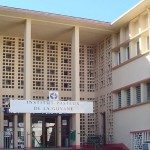Link to HAL – Click here
Link to DOI – 10.1016/j.lana.2021.100047
Lancet Reg Health, 2021. 4:100047Epub.
Background: Illegal gold miners are currently key hosts for malaria in French Guiana (FG), with a risk of emergence of resistance linked to improper use of artemisinin-based combination therapy (ACT). The remoteness of the mines and regulatory issues hinder their access to health care. Methods: A quasi-experimental researched project (Malakit) implemented in FG borders with Brazil and Suriname aimed at determining the effectiveness of distributed kits for self-diagnosis and self-treatment to illegal gold miners, after training, at strategic border staging areas. Evaluation relied on questionnaires at inclusion and follow-up visits, and pre/post intervention surveys. The primary outcome was the proportion of persons reporting a use of certified ACT after a positive malaria diagnosis. The secondary outcomes assessed antimalarial adherence, kit use and impact on malaria epidemiology. Findings: The proportion of patients reporting a use of certified ACT after a positive diagnosis increased after the intervention (OR 1.8, 95%CI [1.1-3.0]). From April 2018 to March 2020, 3,733 persons participated in the intervention. The kit was used correctly by 71.7% [65.8-77.7] of the 223 persons reporting having used a malakit during the follow-up visits. No serious adverse events related to the misuse of malakit have been reported. The intervention appears to have accelerated the decline in malaria incidence in the region by 42.9%. Interpretation: This innovative international project showed that people with low education can correctly self-manage their malaria symptoms. This strategy could be integrated in the malaria control programs of the countries involved and considered in other regions with residual malaria in remote areas.

